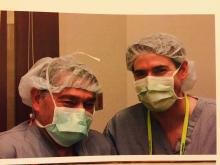As I write this last installment of “The Right Choice?” for ACS Surgery News, a number of different emotions are going through my mind all at the same time. I am surprised at how quickly the time has passed since I wrote my first surgical ethics column for SN in 2011. In the 33 columns that I have written since then, I have tried to focus on aspects of surgical practice that emphasize the ethical dimension. I have tried to write columns that would be of interest to practicing surgeons in any setting and not only to academic surgeons that practice in urban environments such as I practice in. This is the last column and thus the end of a chapter of my life and the beginning of a new one.
Over the last 7 years, I have been flattered by the comments from fellow surgeons who report that they actually read the column. I have always said that I wrote this column with the expectation that no one would actually read them. I have to confess that this is not completely true. As I wrote each column, I did so as though I was writing them for my father to read. My father, S. Peter Angelos, MD, FACS, was a general surgeon who spent his entire career practicing in the town of Plattsburgh, N.Y., where he grew up. My father’s practice was very different from mine. I work at an urban academic medical center where I have a very narrow subspecialty practice in endocrine surgery. My father had a small-town community practice of “bread and butter” general surgery. Yet, when he and I would talk about patients, the commonality of the relationship between a surgeon and a patient transcended these differences. I realize that in many ways, I wrote this column as a way of organizing my own thoughts and then presenting them to my father in the hopes that he would find them of some value.
For several years, I would send drafts of my column to my parents, and both my father and mother would read them and give me suggestions. Many of the earlier columns were changed for the better by their comments. In recent years, my father’s health declined and he was no longer able to give me comments. Nevertheless, I continued to compose them as though writing for him. Approximately 6 weeks ago, my father passed away. It has been sad for my mother and my entire family. We all realized that it was the end of one chapter of our lives and the start of a new one without my father.
I find the concept of “beginning a new chapter” to be an important one for surgeons to reflect upon. There are certain events, such as the death of a parent, that force us to think about the end of one phase of life and the beginning of another phase. However, the division of one’s experience into phases or chapters, is somewhat arbitrary. This past summer I became a patient and had surgery myself for the first time. I cannot help but think of that operation as the start of a new chapter for me. I am convinced that although all patients may not reflect upon surgery in the same way that I did, nevertheless, an operation is a dramatic event that most people remember for a long time. In this context, many people will see their interactions with their surgeon and their operation as the end of one chapter and the beginning of a new one.
In this context, it is critical for surgeons to be fully cognizant of the great impact that we may have on our patient’s internal narratives of their lives. When we operate on someone, we run the risk of that person’s functional status changing forever. We may be the means by which our patient is cured of cancer or suffers a debilitating complication. As surgeons, we therefore, occupy a potentially significant role in the trajectory of our patients’ lives. I believe that the relationship between a surgeon and a patient is distinctive and central in the narrative that so many patients create about their lives. It is essential that surgeons continue to appreciate the value of the quality of that relationship with our patients and the impact—potentially positive or negative—that it can have upon our patients.
Throughout medicine, in general, and in surgery in particular, one cannot go a week without hearing about the problem of burnout. Although there is no single cure for burnout, I do believe that paying attention to the ethical dimension of our interactions with our patients and the impact that surgery can have on their lives will go a long way to reducing the risks of burnout among surgeons.
In an era in which we are often pushed to increase RVUs at the expense of spending time with individual patients, we must not forget how significant our relationships with our patients can be. I believe that attention to this relationship will be beneficial to patients and also to us as we help our patients start new chapters in their lives.
Dr. Angelos is the Linda Kohler Anderson Professor of Surgery and Surgical Ethics, chief of endocrine surgery, and associate director of the MacLean Center for Clinical Medical Ethics at the University of Chicago.

